
The Crassulaceae, also known as the stonecrop family or the orpine family, are a diverse family of dicotyledon flowering plants characterized by succulent leaves and a unique form of photosynthesis, known as Crassulacean acid metabolism (CAM). Flowers generally have five floral parts. Crassulaceae are usually herbaceous but there are some subshrubs, and relatively few treelike or aquatic plants. Crassulaceae are a medium size monophyletic family in the core eudicots, among the order Saxifragales, whose diversity has made infrafamilial classification very difficult. The family includes approximately 1,400 species and 34–35 genera, depending on the circumscription of the genus Sedum, and distributed over three subfamilies. Members of the Crassulaceae are found worldwide, but mostly in the Northern Hemisphere and southern Africa, typically in dry and/or cold areas where water may be scarce, although a few are aquatic.
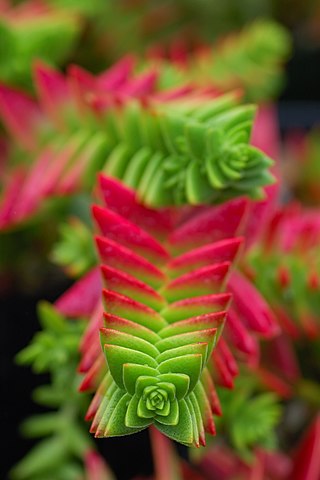
Crassula is a genus of succulent plants containing about 200 accepted species, including the popular jade plant. They are members of the stonecrop family (Crassulaceae) and are native to many parts of the globe, but cultivated varieties originate almost exclusively from species from the Eastern Cape of South Africa.

Crassula multicava is a perennial succulent plant from the family Crassulaceae. It is also known under various common names including the fairy crassula, pitted crassula and London pride.

Crassula tetragona is a succulent plant native to Southern Africa. It is widely distributed from the Orange River boundary of Namaqualand to beyond the Kei River in the Eastern Cape. "Tetragona" comes from the phyllotaxy of the leaves. It is popularly named the "miniature pine tree" among ornamental plant enthusiasts, for its popular use as a "pine tree" in Bonsai.

Crassula arborescens, the silver jade plant, silver dollar plant, beestebul, Chinese jade, money plant, or money tree, is a species of succulent plant in the family Crassulaceae. It is an endemic plant of the Western Cape, South Africa. It is a 2 to 4 ft succulent shrub. It has round gray "Silver Dollar" leaves. It blooms in summer, with white to pink flowers. It is cultivated as an ornamental plant for use in drought tolerant and succulent gardens, and in container gardens. It is also suitable for growing indoors as a houseplant.

Crassula marnierana, common name Jade Necklace or Chinese Pagoda, is a species of succulent flowering plant in the family Crassulaceae.

Crassula capitella, is a perennial succulent plant native to southern Africa.
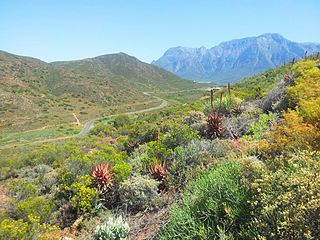
Robertson Karoo is a semi-arid vegetation type, restricted to sections of the Breede River Valley, Western Cape Province, South Africa. It is a subtype of Succulent Karoo and is characterised by the dominance of succulent plant species, and by several endemic plants and animals.

Crassula nudicaulis is a succulent plant native to South Africa, and Lesotho.

Crassula brevifolia is a succulent plant native to the arid western edge of South Africa as well as southern Namibia.

Crassula pellucida is a creeping, succulent ground-cover, or low-growing, spreading succulent shrub. It is native to eastern and southern Africa, ranging from Kenya and Angola to South Africa.

Crassula alpestris, also known as the sand-coated crassula, is a species of flowering plant in the genus Crassula endemic to the Cape Provinces of South Africa. Crassula alpestris subsp. massonii is a variety of the species, also found in South Africa.
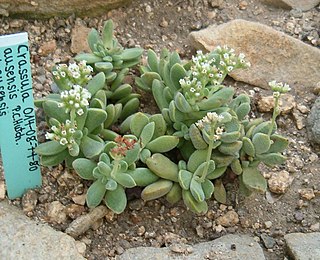
Crassula ausensis is a species of succulent in the genus Crassula found in Namibia. Crassula ausensis subsp. giessii and Crassula ausensis subsp. titanopsis are varieties of the species.

Crassula clavata, is a species of succulent plant in the genus Crassula endemic to the Cape Provinces of South Africa.
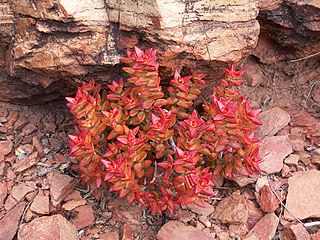
Crassula rupestris, called buttons on a string, is a species of Crassula native to Namibia and to the Cape Provinces of South Africa. It has gained the Royal Horticultural Society's Award of Garden Merit. It is also called bead vine, necklace vine, and rosary vine.
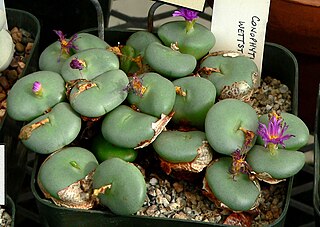
Conophytum wettsteinii is a species of flowering plant in the genus Conophytum, native to the northwest Cape Provinces of South Africa. It is known to grow in rocky regions, often nearby Crassula elegans. C. wettsteinii is a small groundcover species, which appears stemless with fused leaf-pairs having a obconical shape. This plant relies on winter rains and is mainly dormant in summer months. Best growth occurs when drainage is available, and when only shaded during mid-summer. Propegation can occur through seeds or through cuttings from a full grown plant, where each cutting contains at least 1 head and a fraction of root. It has gained the Royal Horticultural Society's Award of Garden Merit.

Crassula ericoides is a species of succulent plant in the genus Crassula native to South Africa. Growing in the fynbos ecosystem of South Africa, C. ericoides somewhat resembles a heather, growing into an upright shrub with bare lower stems and yellow flowers at the tips.
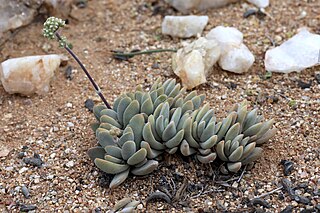
Crassula namaquensis is a species of succulent plant in the genus Crassula native to South Africa. Easily confused with some forms of Crassula tecta and Crassula sericea, this species has rounded to elongated leaves that are usually blue, covered in fine hairs, and form clumps.


















